Trong bài viết này Huyền và team đã tổng hợp phrasal verb theo chủ đề để mọi người có thể áp dụng vào các bài thi IELTS Speaking nhé.
Chúng ta thường biết từ “go” có nghĩa là “đi” nhưng khi kết hợp với trạng từ hoặc giới từ thì nghĩa sẽ thay đổi hoàn toàn như
- go up: tăng
- go down: giảm
- go out with someone : hẹn hò với ai đó
- Ví dụ:
- Cigarettes are going up in price. (Thuốc lá đang tăng giá.)
- Oil is going down in price. (Dầu đang giảm giá.)
- Tom has been going out with Lucy for six weeks. (Tom đã hẹn hò với Lucy được sáu tuần.)
Ở các câu trên cụm từ go up, go down, go out with được gọi là cụm động từ hay Phrasal Verb.
Vậy Phrasal Verb là gì? Tầm quan trọng của Phrasal Verb trong IELTS như thế nào? Huyền sẽ chia sẻ chi tiết kèm tài liệu và bài tập thực hành ở bài này Huyền cho mọi người tham khảo nhé.
Phrasal Verb là gì?
Định nghĩa: Phrasal verb (Cụm động từ) là một động từ (verb) kết hợp với một trạng từ (adverb) hoặc một giới từ (preposition), hoặc đôi khi cả hai, để mang lại một ý nghĩa mới, ví dụ như 3 cụm từ trên.
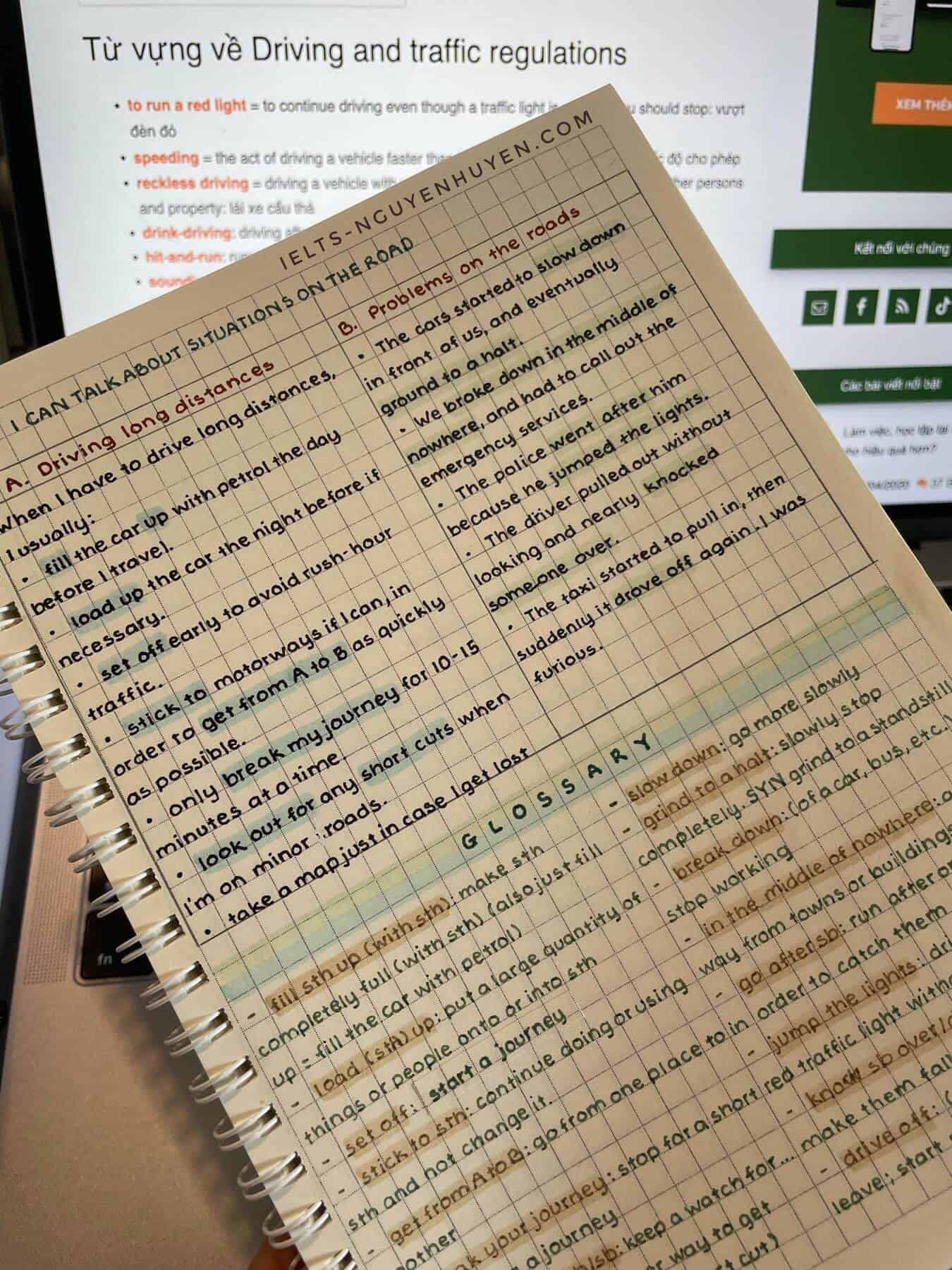
Cấu trúc Phrasal Verb
Cấu trúc 1
Verb + preposition (with, on, in, at, from, to, by, about,…)
Ex: concentrate on, agree with, suffer from,…
Increasing numbers of children are suffering from mental health problems.
Cấu trúc 2
Verb + adverb (up, off, down, back, along,…)
Ex. look up, put off, break down,…
It’s too late to put them off now.
Cấu trúc 3
Verb + adverb + preposition
Ex. run out of, look forward to, catch up with,…
I’ve run out of milk/money/ideas/patience.
Tầm quan trọng của Phrasal Verb trong IELTS
Phrasal Verb được sử dụng rất nhiều trong IELTS nói riêng cũng như tiếng Anh nói chung, luôn được dùng trong giao tiếp hằng ngày, văn bản và là một trong những tiêu chí để đánh giá khả năng sử dụng ngôn ngữ của mình.
Khi học theo Phrasal Verb sẽ giúp chúng ta liên kết các câu với nhau một cách có hệ thống, giúp nhớ lâu hơn và tránh được việc dịch word-by-word.
Phrasal Verb trong IELTS Listening và Reading: Phrasal Verb hầu như xuất hiện trong hầu hết các bài Listening và Reading, mình cần hiểu được đúng nghĩa của những cụm động từ trong bài để tìm ra đáp án chính xác cho câu hỏi.
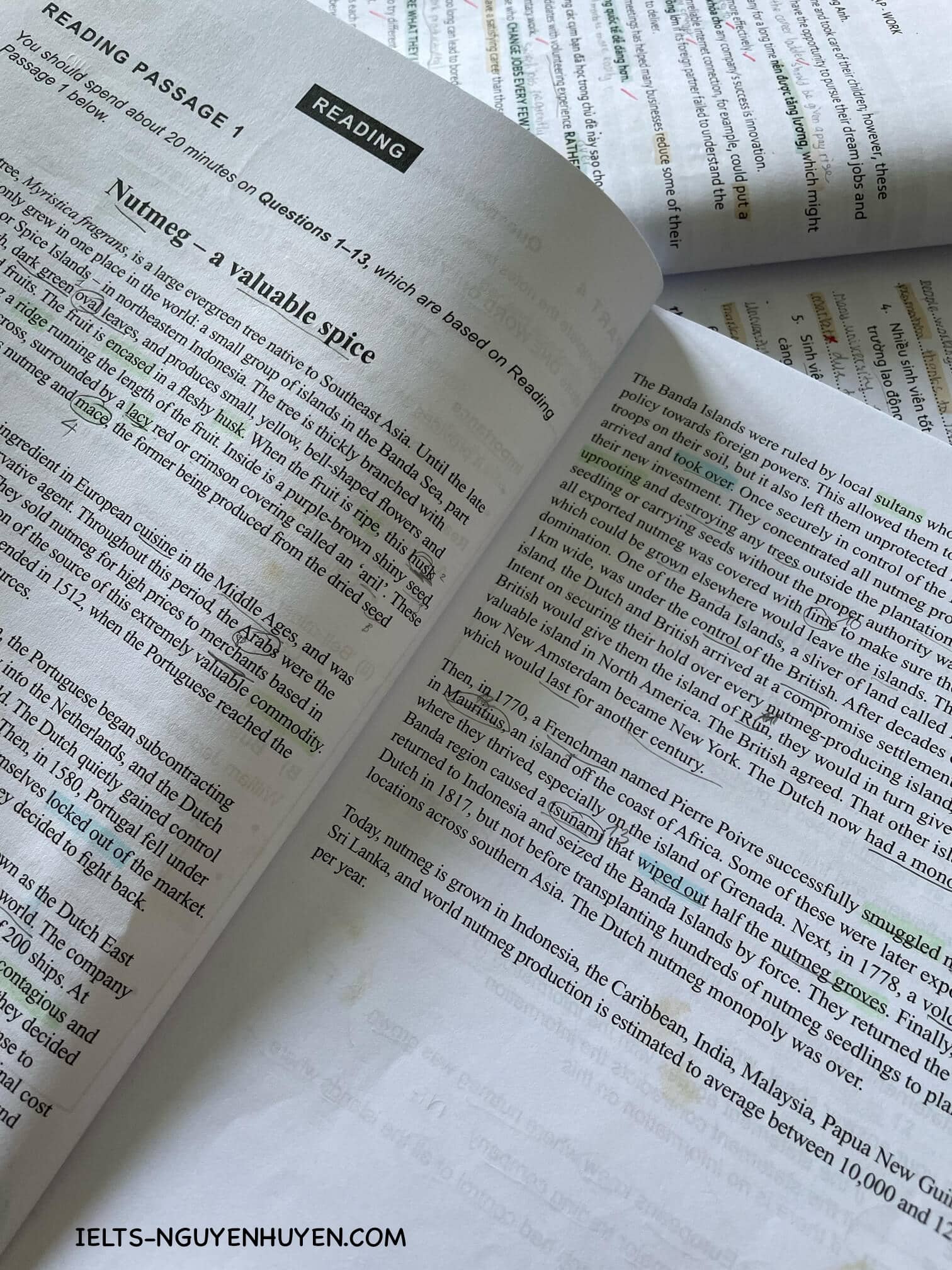
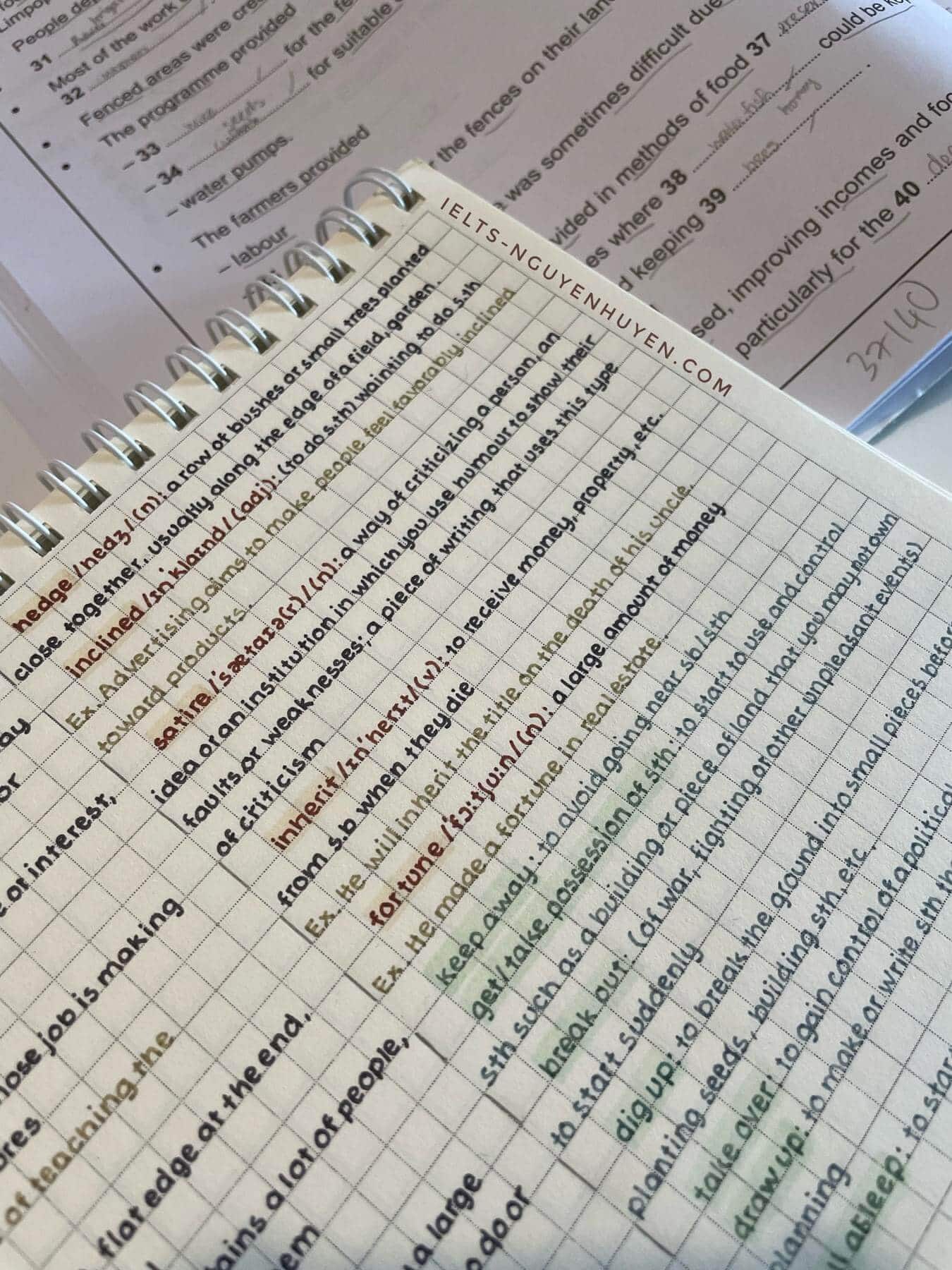
Phrasal Verb trong IELTS Speaking: là 1 trong 4 tiêu chí để giám khảo đánh giá khả năng của mình (tiêu chí Lexical Resource), nên việc linh hoạt kết hợp sử dụng các Phrasal Verb trong bài nói là rất quan trọng.
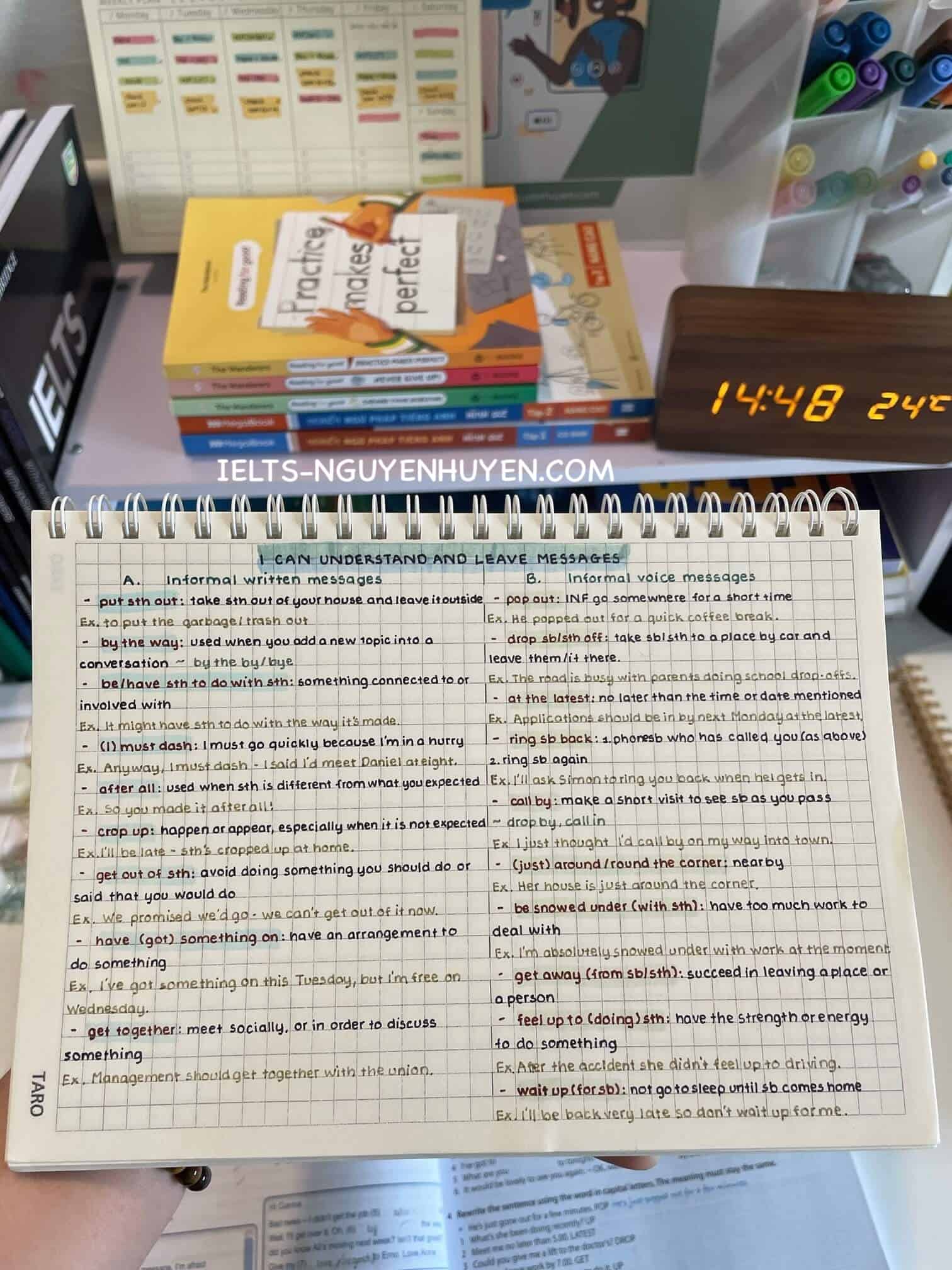
Phrasal Verb trong IELTS Writing: tương tự Speaking, Phrasal Verb cũng cần được sử dụng trong Writing để giúp tăng band điểm cho tiêu chí Lexical Resource tuy nhiên cần lưu ý lựa chọn Phrasal Verb phù hợp có sắc thái “formal” và áp dụng đúng với ngữ cảnh nhé.
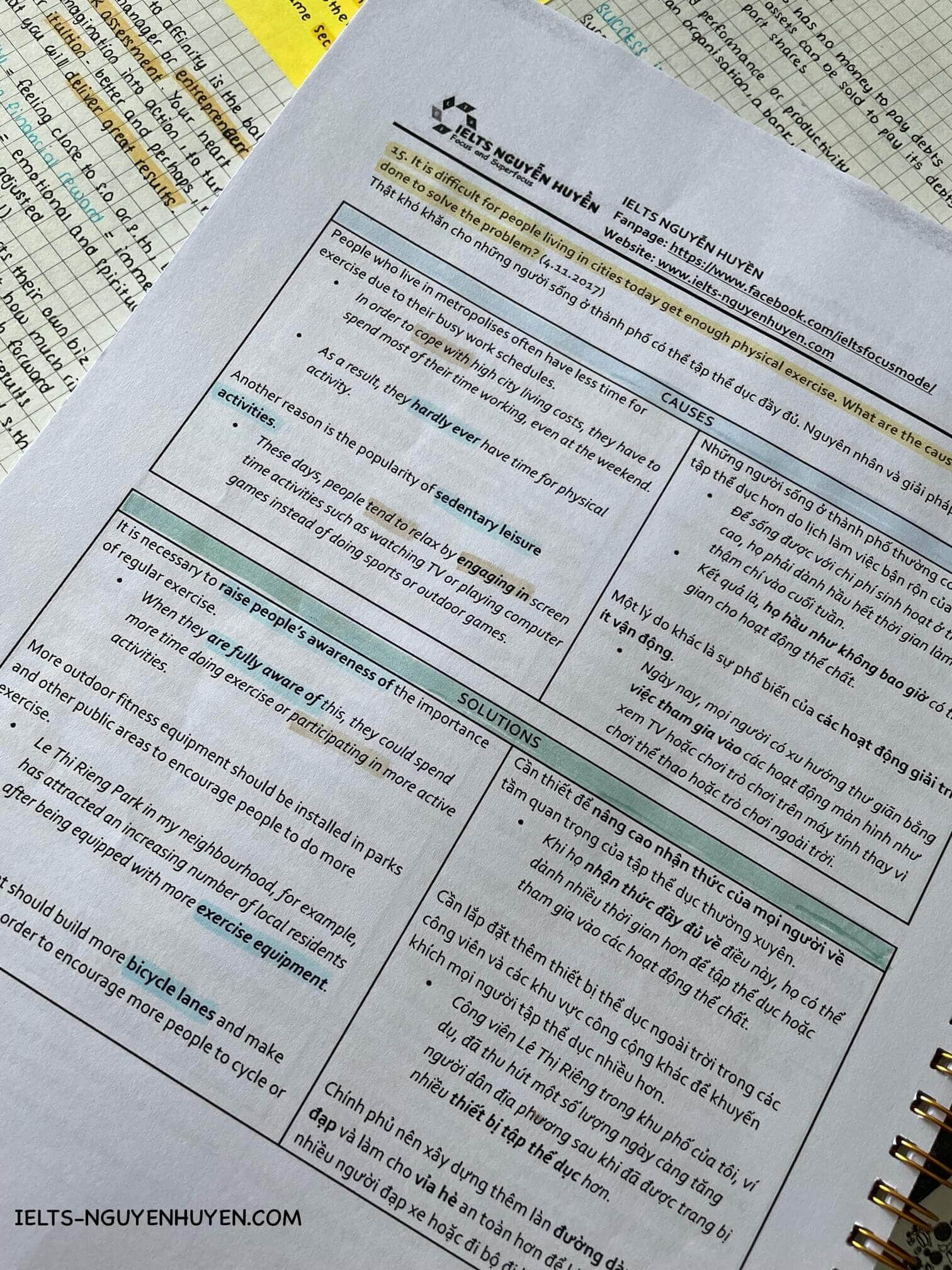
Tổng hợp Phrasal Verb theo từng chủ đề
Environment
| Phrasal Verb | Nghĩa | Ví dụ |
| die out: biến mất dần dần và cuối cùng trở nên tuyệt chủng/ biến mất hoàn toàn | to stop existing | This species has nearly died out because its habitat is being destroyed. |
| cut down/chop down: chặt cây/đốn hạ | to make something fall down by cutting it at the base | Some trees had been cut down. |
| wipe out: xoá sổ | to destroy or remove somebody/something completely | Whole villages were wiped out by the earthquake. |
| dry up: cạn nước, khô cạn | (of rivers, lakes, etc.) to become completely dry | During the drought the river dried up. |
| clean up: dọn dẹp | to remove dirt, etc. from somewhere | It took me the rest of the day to clean (the place) up. |
| throw away: vứt bỏ | to get rid of something that you no longer want | US consumers throw away around 100 billion plastic bags annually. |
Health
| Phrasal Verb | Nghĩa | Ví dụ |
| pass out: bất tỉnh | to become unconscious | I was hit on the head and passed out. |
| shake off: thoát khỏi (bệnh) | to get rid of an illness | I hope I can shake off this cold before the weekend. |
| throw up: nôn mửa | to vomit | The smell made me want to throw up. |
| pass away: mất | to die. People say ‘pass away’ to avoid saying ‘die’. | She’s terribly upset because her father passed away last week. |
| crack up: suy sụp | to become ill, either physically or mentally, because of pressure | He thought he’d never get through the ordeal without cracking up. |
| flare up: bùng phát trở lại | (of an illness, injury, etc.) to suddenly start again or become worse | His eczema has flared up again. |
Food/Cooking
| Phrasal Verb | Nghĩa | Ví dụ |
| cut back: cắt giảm | to spend less, do less, or use less of something: | Cutting back on salt is great for your health, but a low-sodium diet can seem bland and boring. |
| dish up/dish out: chuẩn bị bữa ăn | to put food onto dishes; or to provide a meal | The crew dished up fish sandwiches to the hungry workers. |
| eat out: ăn ngoài | to have a meal in a restaurant, etc. rather than at home | When I lived in Spain, I used to eat out all the time. |
| mix in: trộn | to add one substance to others, especially in cooking | When the rice is cooked, gently mix in all the other ingredients. |
| force down: ép mình ăn hoặc uống thứ gì đó | to make yourself eat or drink something that you do not really want | She felt sick but managed to force down a piece of toast. |
| put away: ăn 1 lượng lớn | to eat or drink large quantities of something | He can put away a whole loaf of bread in one go. |
Travel
| Phrasal Verb | Nghĩa | Ví dụ |
| take off: cất cánh | (of an aircraft, etc.) to leave the ground and begin to fly | The plane took off an hour late. |
| check out: thanh toán hóa đơn và rời khách sạn,.. | to pay your bill and leave a hotel, etc. | Guests should check out of their rooms by noon. |
| hit the road/trail: bắt đầu một chuyến đi | to start a journey | The following spring I hit the road. |
| get in: đến địa điểm | to arrive at a place | What time do you get into Heathrow? |
| see off: tiễn | to go to a station, an airport, etc. to say goodbye to somebody who is starting a journey | My parents saw me off at the airport. |
| get away: đi vắng | to have a holiday | We’re hoping to get away for a few days at Easter. |
Transport
| Phrasal Verb | Nghĩa | Ví dụ |
| speed up: tăng tốc độ, chạy nhanh hơn | to move or happen faster; to make something move or happen faster | They have speeded up production of the new car. |
| pull up: dừng lại | (of a vehicle or its driver) to stop | He pulled up at the traffic lights. |
| pick up: đón | to go somewhere in your car and collect somebody who is waiting for you | I’ll pick you up at five. |
| knock down: đụng trúng | to hit somebody and make them fall to the ground | She was knocked down by a bus. |
| pull over: tấp vào lề | (of a vehicle or its driver) to move to the side of the road in order to stop or let something pass | She saw the ambulance coming up behind her and pulled over. |
| slow down/up: chạy chậm lại | to become slower, or to make someone or something become slower | Slow down, you two, you’re walking too fast! |
Money
| Phrasal Verb | Nghĩa | Ví dụ |
| save up: tiết kiệm tiền | to keep money so that you can buy something with it in the future | It took me months to save up enough money to go travelling. |
| shell out/fork out: chi rất nhiều tiền vào thứ gì đó | to pay a lot of money for something | The band shelled out $100 000 for a mobile recording studio. |
| rake in: kiếm nhiều tiền | to earn a lot of money, especially when it is done easily | The movie raked in more than $300 million. |
| pay back: trả tiền lại | to return money that you borrowed from somebody | You can pay back the loan over a period of three years. |
| rip off: lừa gạt | to cheat somebody, by making them pay too much, by selling them something of poor quality, etc. | Tourists complain of being ripped off by local cab drivers. |
| put aside: dành dụm | to save something or keep it available to use | We put some money aside every month for our retirement. |
Relationships
| Phrasal Verb | Nghĩa | Ví dụ |
| hit it off (with somebody): có một mối quan hệ thân thiện tốt với ai đó | to have a good friendly relationship with somebody | We hit it off straight away. |
| lose touch (with somebody/something): không còn liên lạc với ai/cái gì nữa | to no longer have any contact with somebody/something | I’ve lost touch with all my old friends. |
| drift apart: trở nên ít thân thiện hoặc gần gũi với ai đó | to become less friendly or close to somebody | As children we were very close, but as we grew up we just drifted apart. |
| break up: tan vỡ | to come to an end | Their marriage has broken up. |
| grow apart: xa cách | to stop having a close relationship with somebody over a period of time | Since moving to London, he’s grown apart from many of his friends. |
| ask out: mời đi chơi | to invite somebody to go out with you, especially as a way of starting a romantic relationship | He’s too shy to ask her out. |
Emotions
| Phrasal Verb | Nghĩa | Ví dụ |
| choke up: nghẹn ngào | to find it difficult to speak, because of the strong emotion that you are feeling | She choked up when she began to talk about her mother. |
| cheer up: vui lên | to become more cheerful; to make somebody/something more cheerful | Oh, come on—cheer up! |
| tear apart/up: đau lòng | to make somebody feel very unhappy or worried | It tears me apart to think I might have hurt her feelings. |
| bottle up: kèm nén | to not allow other people to see that you are unhappy, angry, etc., especially when this happens over a long period of time | Try not to bottle up your emotions. |
| freak out: hoảng hốt | to become or cause someone to become extremely emotional | He freaked out when he heard he’d got the job. |
| calm down: bình tĩnh | to become or make somebody/something/yourself become calm | We waited inside until things calmed down. |
Family
| Phrasal Verb | Nghĩa | Ví dụ |
| take after: giống người trong nhà | to look or behave like an older member of your family, especially your mother or father | Your daughter doesn’t take after you at all. |
| bring up: nuôi dưỡng | to care for a child, teaching him or her how to behave, etc. | He was brought up by his aunt. |
| split up: chia tay | to stop having a relationship with somebody | She’s split up with her boyfriend. |
| get along/on: sự hòa hợp | to have a friendly relationship with somebody | She and her sister have never really got on. |
| look after: chăm sóc | to be responsible for or to take care of | Who’s going to look after the children while you’re away? |
| care for: chăm sóc ai đó đang bị ốm, người già hoặc trẻ em | to protect someone or something and provide the things they need, especially someone who is young, old, or ill | She can’t go out to work because she has to stay at home to care for her elderly mother. |
Weather
| Phrasal Verb | Nghĩa | Ví dụ |
| bucket down: mưa to | to rain heavily | It’s bucketing down. |
| cool down: hạ nhiệt | to become cool or cooler | We cooled off with a swim in the lake. |
| blow over: một cơn bão hoặc gió mạnh đang kết thúc hoặc đang di chuyển đi | When a storm blows over, it becomes gradually less strong until it ends | The storm raged all night but by morning it had blown over. |
| be snowed up: không thể ra ngoài vì tuyết dày đặc | (especially of a road) to be blocked with snow | The driveway was still snowed up. |
| flood out: buộc ai đó phải rời khỏi nhà vì lũ lụt | to force somebody to leave their home because of a flood | The river flooded them out every few years. |
| hold off: (mưa hoặc bão) không bắt đầu | (of rain or a storm) to not start | The rain held off just long enough for us to have our picnic. |
Job/Career
| Phrasal Verb | Nghĩa | Ví dụ |
| lay off: sa thải | to stop employing somebody because there is not enough work for them to do | 200 workers at the factory have been laid off. |
| get ahead: thành công trong công việc | to make progress (further than others have done) | She wants to get ahead in her career. |
| pile up: công việc chồng chất | to become larger in quantity or amount | Work always piles up at the end of the year. |
| take over: đảm nhận công việc | to begin to have control of or responsibility for something, especially in place of somebody else | Paul’s daughter took over the job in 2017. |
| be snowed under (with something): gặp khó khăn với quá nhiều thứ phải làm | to have more things, especially work, than you feel able to deal with | I’d love to come but I’m completely snowed under at the moment. |
| slack off: trở nên lười biếng | to do something more slowly or with less energy than before | He’s gone from success to success in his movie career, and there’s no sign of him slacking off. |
Education
| Phrasal Verb | Nghĩa | Ví dụ |
| drop out: bỏ học nửa chừng | to leave school, college, etc. without finishing your studies | She started a degree but dropped out after only a year. |
| fall behind: chậm hoặc thua kém so hơn với ai đó/cái gì đó | to fail to keep level with somebody/something | He was ill for six weeks and fell behind with his schoolwork. |
| read up on: đọc nhiều về một chủ đề | to read a lot about a subject | I’ll need to read up on the case before the meeting. |
| go over: ôn lại | to examine or check something carefully | Go over your work before you hand it in. |
| hand in/turn in: nộp | to give something to a person in authority, especially a piece of work or something that is lost | You must all hand in your projects by the end of next week. |
| mug up: học vội | to learn something, especially in a short time for a particular purpose, for example an exam | He’s frantically mugging up on Japanese before his trip to Tokyo. |
Bài tập thực hành kèm đáp án
Tài liệu tham khảo:
Các bạn đúng được bao nhiêu câu c.m.t cho Huyền biết nhé. Huyền hi vọng bài viết này sẽ hữu ích cho mọi người nè. <3
